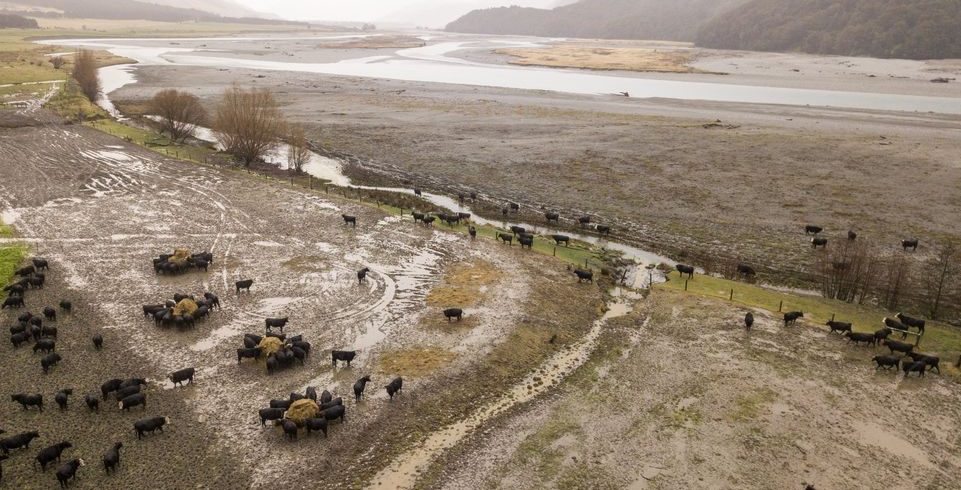
Intensive Winter Grazing harms much more than our clean, green Aotearoa
October 20th, 2020In winter 2019, shocking images of cows up to their knees in mud, unable to lie down and rest, were in the media. Aerial footage revealed extensive environmental degradation in parts of Otago and Southland. A Southland kindergarten was even forced to close when runoff from a nearby farm washed through their grounds. The main culprit behind all of these problems? Intensive winter grazing – a common practice that causes animal suffering, environmental damage and problems for human health.
Intensive winter grazing is the practice of ‘strip feeding’ cows (as well as sheep and deer) over the colder months when grass is scarce, particularly in Southland and Otago. A large number of cows are confined to a restricted area, where they remain until the groundcover has been grazed down to bare mud. This practice is especially problematic because too many animals are kept in a small space. Intensive winter grazing is also carried out in unsuitable parts of the country, where there is high rainfall and vulnerable waterways.
When an area of pasture or crop has been completely grazed, another section will be opened up. Over several weeks, heavy animals walking across bare, wet land creates a deep, muddy mess. Cows often have to walk across the paddock to get to their water trough, which worsens the problem. Cows may end up standing knee-deep in mud and may even be forced to give birth in these conditions.
A barren muddy paddock is no place for a cow
Cold, wet winters can be challenging enough for humans to endure, and we usually have a safe place in which to keep warm and dry. Cows kept in intensive winter grazing systems have no protection from the weather ‒ they are forced to live and often give birth in wet, muddy paddocks, exposed to the elements.
Cows left in muddy paddocks can lack clean water and adequate feed, causing thirst, hunger and distress. Sometimes they are left with no other option but to drink their own waste. Intensive winter grazing also puts cows at risk of health problems such as mastitis, a painful inflammation of their udder.
After intensive winter grazing, the landscape is left bare and all plants have been replaced by mud. The level of the mud can be up to the cows’ shins and sometimes their bellies even touch the mud.
The mud stops cows from resting comfortably. Cows prefer to lie on soft, dry and clean surfaces and are reluctant to lie down in cold, wet mud, yet because of intensive winter grazing they are forced to do so to rest. The cows are often exhausted before they eventually lie down in the mud.
These conditions are especially dangerous for pregnant mothers and newborn calves. When kept in muddy conditions, the cows have wet feet for weeks on end, which predisposes them to lameness after calving. A poor diet in late pregnancy is also risky for the health of the mother and calf.
For the vulnerable calves, intensive winter grazing means that their first experience of life is a cold, wet field. As mammals, cows are maternal animals who want to care for and protect their babies, yet when forced to give birth in the mud they can do little to protect their calves. Some calves do not survive. Walking through the mud is exhausting, and calves can drown in the mud. This is no place for a calf to be born.
Wide reaching environmental and health impacts
As well as harming animals, intensive winter grazing also damages our environment. When a large number of heavy animals are crammed into a small space, they churn up the soil and produce a huge amount of excrement. When it rains, topsoil is lost from the land, and sediment flows off the paddock along with contaminants and waste ‒ all of which can end up in our waterways.
Runoff causes a thick layer of sediment to build up in riverbeds. This layer of sludge destroys the habitat of the invertebrates who live in the riverbeds. The runoff also disrupts the natural balance of the ecosystem, affecting all the freshwater species and other animals who rely on healthy waterways to survive.
Additionally, intensive winter grazing is problematic for human health. In some areas, it is carried out adjacent to the town water supply, and untreated waste may flow over the land and into the water supply. Water quality is essential for human health, and intensive winter grazing can make waterways unsafe for drinking, recreation and cultural activities.
Despite a review, nothing has changed for cows
In response to the 2019 media exposé and calls for a review from SAFE and others, a Winter Grazing Taskforce was established by Government. The Taskforce issued a report which emphasised the negative impacts of intensive winter grazing on the animals and made 11 recommendations for how animal welfare could be improved.
However, little has changed since the report was issued. Animals continue to suffer in muddy fields, and there are still no rules to protect pregnant mothers and newborns. Cows continue to give birth and calves continue to die in the mud.
It is appalling that this practice continues in Aotearoa. New Zealanders care about animals, their environment and protecting their health, and intensive winter grazing undermines this. We urgently need to end intensive winter grazing.
Moving away from dairy is a choice that benefits animals, our planet and our health. Try dairy-free and sign up to our Dairy-Free challenge today.
